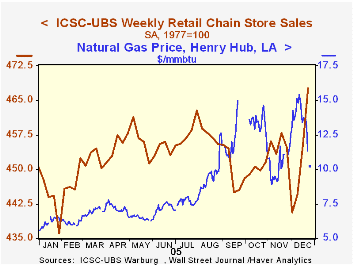 Global| Dec 28 2005
Global| Dec 28 2005Chain Store Sales Reflect A Cheery Spirit & Lower Gas Prices
by:Tom Moeller
|in:Economy in Brief
Summary
Chain store sales added 2.8% last week to the 2.4% jump during the week prior according to the International Council of Shopping Centers (ICSC)-UBS survey. The two increases did much to rescue the December average from an abysmal [...]

Chain store sales added 2.8% last week to the 2.4% jump during the week prior according to the International Council of Shopping Centers (ICSC)-UBS survey.
The two increases did much to rescue the December average from an abysmal start when sales fell 3.1% during the opening week. As a result the month's average is down just 0.8% from November which rose 1.2% from October.
During the last ten years there has been a 51% correlation between the y/y change in chain store sales and the change in non-auto retail sales less gasoline, as published by the US Census Department. Chain store sales correspond directly with roughly 14% of non-auto retail sales less gasoline. Lower gasoline prices may have added to consumers' Holiday spirit. Retail gas prices fell a penny to $2.20 per gallon (22.7% y/y) last week after two weeks of moderate increase. Natural gas prices also backed off a bit after five weeks of strong gain although they were still roughly double last year's level. Further declines in gasoline & natural gas prices were evident in yesterday's spot market trading when gasoline ended down four cents from the week prior. Warmer weather helped lower natural gas prices roughly $3/mmbtu or 22% to the lowest level since mid-November.The ICSC-UBS retail chain-store sales index is constructed using the same-store sales (stores open for one year) reported by 78 stores of seven retailers: Dayton Hudson, Federated, Kmart, May, J.C. Penney, Sears and Wal-Mart.
| ICSC-UBS (SA, 1977=100) | 12/24/05 | 12/17/05 | Y/Y | 2004 | 2003 |
|---|---|---|---|---|---|
| Total Weekly Chain Store Sales | 467.6 | 455.0 | 3.9% | 4.6% | 2.9% |
Tom Moeller
AuthorMore in Author Profile »Prior to joining Haver Analytics in 2000, Mr. Moeller worked as the Economist at Chancellor Capital Management from 1985 to 1999. There, he developed comprehensive economic forecasts and interpreted economic data for equity and fixed income portfolio managers. Also at Chancellor, Mr. Moeller worked as an equity analyst and was responsible for researching and rating companies in the economically sensitive automobile and housing industries for investment in Chancellor’s equity portfolio. Prior to joining Chancellor, Mr. Moeller was an Economist at Citibank from 1979 to 1984. He also analyzed pricing behavior in the metals industry for the Council on Wage and Price Stability in Washington, D.C. In 1999, Mr. Moeller received the award for most accurate forecast from the Forecasters' Club of New York. From 1990 to 1992 he was President of the New York Association for Business Economists. Mr. Moeller earned an M.B.A. in Finance from Fordham University, where he graduated in 1987. He holds a Bachelor of Arts in Economics from George Washington University.
More Economy in Brief
 Global| Feb 05 2026
Global| Feb 05 2026Charts of the Week: Balanced Policy, Resilient Data and AI Narratives
by:Andrew Cates






